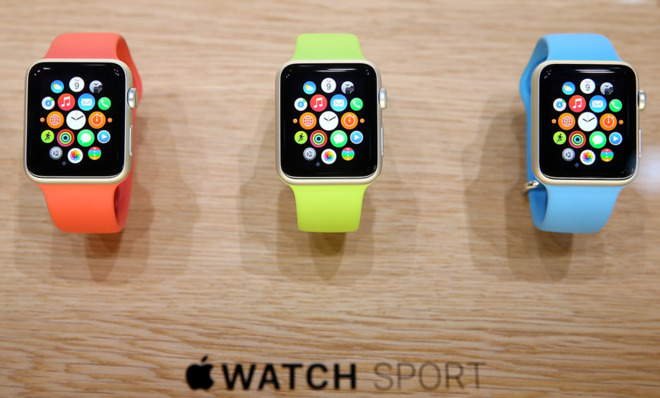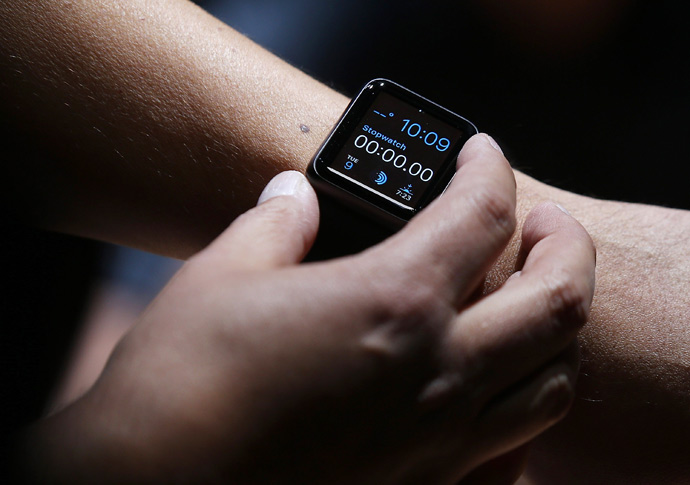Seriously, what's the point of the Apple Watch?
The tech company's latest offering is little more than a fashion accessory

A free daily email with the biggest news stories of the day – and the best features from TheWeek.com
You are now subscribed
Your newsletter sign-up was successful
"We've got one more thing," Apple's CEO Tim Cook said, his voice tinged with excitement. A thunderous roar emanated from the crowd in the amphitheater, as if the product unveiling had suddenly morphed into a religious festivity, a techno-superchurch replete with its own house band (U2, naturally).
Tim Cook used Steve Jobs' mantra of "one more thing" to reveal the Apple Watch, the company's "most personal device ever." In a press release, Cook didn't hold back on the Watch's potential, saying, "Apple is poised to captivate the world with a revolutionary product that can enrich people’s lives."
And with that, Apple confirmed that it isn't a serious computing company anymore. Indeed, it's difficult to discern what Apple is these days, besides a place for the Apple faithful to congregate.
The Week
Escape your echo chamber. Get the facts behind the news, plus analysis from multiple perspectives.

Sign up for The Week's Free Newsletters
From our morning news briefing to a weekly Good News Newsletter, get the best of The Week delivered directly to your inbox.
From our morning news briefing to a weekly Good News Newsletter, get the best of The Week delivered directly to your inbox.
In one level, it's clear Apple is aiming to solidify its status as a lifestyle company. The Watch, for example, is able to monitor your heartbeat. Its Activity app "measures three separate aspects of movement: calories burned, brisk activity, and how often you stand up during the day," which is supposed to "help motivate you to be more active throughout the day."
The Watch makes a meticulous record of all these factors and "uses this history to suggest personal, realistic goals, reward fitness milestones, and keep you motivated." Lifestyle guidance, on your wrist.

But more than anything, the Watch seems like a sop to its religious following, which needs to be satisfied if Apple is to remain a profitable business. This was a critically important unveiling for Apple. The Watch is its first new product category since the iPad — and meanwhile, Apple's competitors have either closed the gap or moved on.
Apple's rivals — Samsung, Sony, Google, Amazon, Facebook, Microsoft, HTC, Xaomi — have assimilated and built upon Apple's design cues and innovations. Google Android devices have outsold Apple's iOS devices by large margins in all major markets.
A free daily email with the biggest news stories of the day – and the best features from TheWeek.com
More worryingly, Apple's competitors are making bold forays into new realms of technology. Google is developing self-driving cars, smart glasses, and artificial intelligence, and is even delving into life extension technology. Amazon has developed the Prime ecosystem that offers free one-day delivery (and in the future, drone delivery) on items from Amazon's warehouses. Elon Musk's car-maker Tesla is pioneering cheaper battery manufacturing technologies that could revolutionize energy storage and the electric grid. Facebook and Sony are taking steps into virtual reality technologies.
And Apple? Apple is buying manufacturers of expensive headphones and launching designer watches.
Is a sensor-laden, fashion-conscious watch really the right product for Apple to be launching in this new environment? I don't think so. The Watch's capabilities don't exceed that of the iPhone and iPad, and we know that because a connected iPhone is necessary for usage. This isn't a case of Apple cannibalizing its own products — as the iPhone successfully did with the iPod — but of creating a fashion accessory for dedicated iPhone owners.
For everyone else, smart watches will only begin to flourish when they can replace a smartphone. Apple is surely preparing for that eventuality, since an internet-connected computer attached to your wrist has the potential to be the future of computing and connectivity, particularly if it's integrated with Apple's new Pay system (which was the real star of yesterday's show).
But the fact that the Watch is not independent of the iPhone just illustrates that the technology is not yet ready for prime time. It's taken Apple years to get to this stage, but if I have to carry my iPhone around with me to use it, it defeats the purpose of the thing. There's little the Watch can offer that I can't do simply by taking my phone out of my pocket.
When the Watch can fly solo, it will be a real alternative for a market beyond Apple evangelicals. But at this stage, the much-hyped Watch does not seem like a major advance, especially next to what Apple's rivals are building.
John Aziz is the economics and business correspondent at TheWeek.com. He is also an associate editor at Pieria.co.uk. Previously his work has appeared on Business Insider, Zero Hedge, and Noahpinion.
-
 Switzerland could vote to cap its population
Switzerland could vote to cap its populationUnder the Radar Swiss People’s Party proposes referendum on radical anti-immigration measure to limit residents to 10 million
-
 Political cartoons for February 15
Political cartoons for February 15Cartoons Sunday's political cartoons include political ventriloquism, Europe in the middle, and more
-
 The broken water companies failing England and Wales
The broken water companies failing England and WalesExplainer With rising bills, deteriorating river health and a lack of investment, regulators face an uphill battle to stabilise the industry